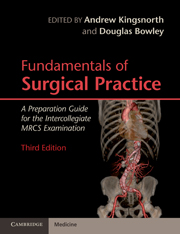Book contents
- Frontmatter
- Contents
- List of contributors
- Preface
- Section 1 Basic Sciences Relevant to Surgical Practice
- Section 2 Basic Surgical Skills
- 5 Surgical techniques and technology
- 6 Professionalism – including academic activities: clinical research, audit, consent and ethics
- 7 Fundamentals of palliative and end of life care
- Section 3 The Assessment and Management of the Surgical Patient
- Section 4 Perioperative Care of the Surgical Patient
- Section 5 Common Surgical Conditions
- Index
- References
7 - Fundamentals of palliative and end of life care
Published online by Cambridge University Press: 03 May 2011
- Frontmatter
- Contents
- List of contributors
- Preface
- Section 1 Basic Sciences Relevant to Surgical Practice
- Section 2 Basic Surgical Skills
- 5 Surgical techniques and technology
- 6 Professionalism – including academic activities: clinical research, audit, consent and ethics
- 7 Fundamentals of palliative and end of life care
- Section 3 The Assessment and Management of the Surgical Patient
- Section 4 Perioperative Care of the Surgical Patient
- Section 5 Common Surgical Conditions
- Index
- References
Summary
Introduction
The palliative care patient is not defined by disease process, body system, age, or care setting, but by entry to the final common pathway of dying, expected to do so within the next 12 to 18 months. Palliative care professionals therefore require wide-ranging clinical skills and experience, with access to a range of expertise within an extended team.
Palliative care grew out of the modern hospice movement established by Dame Cecily Saunders (1918–2005) with the opening of St Christopher's at Sydenham, London, in 1964. Seeing the need, when practising as an almoner and nurse at St Thomas's Hospital, London, she decided change in care of the dying would only come from within the medical profession and retrained as a doctor. She gained postgraduate experience at St Joseph's in Hackney, observing the efficacy of opioids for end of life pain relief. Stepping outside the norms of medical care, Dame Cecily established an organization with a flatter hierarchical structure and multi-professional teams. St Christopher's took the most complex cases and developed an expertise in caring for the dying that has now been replicated in hospices throughout the world. In 1967, she coined the term ‘Total Pain’ having observed the physical, psychological, social, emotional and spiritual dimensions of pain, each of which may need addressing to effect resolution and control. This formed the ethos of holistic palliative care now enshrined in the World Health Organization's (2008) definition.
- Type
- Chapter
- Information
- Fundamentals of Surgical PracticeA Preparation Guide for the Intercollegiate MRCS Examination, pp. 103 - 126Publisher: Cambridge University PressPrint publication year: 2011



